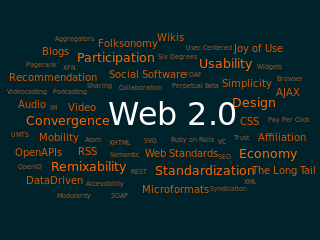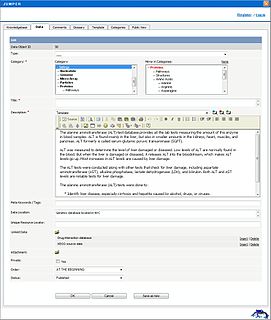
MySQL is an open-source relational database management system (RDBMS). Its name is a combination of "My", the name of co-founder Michael Widenius's daughter, and "SQL", the abbreviation for Structured Query Language. A relational database organizes data into one or more data tables in which data may be related to each other; these relations help structure the data. SQL is a language programmers use to create, modify and extract data from the relational database, as well as control user access to the database. In addition to relational databases and SQL, an RDBMS like MySQL works with an operating system to implement a relational database in a computer's storage system, manages users, allows for network access and facilitates testing database integrity and creation of backups.

KDevelop is a free and open-source integrated development environment (IDE) for Unix-like computer operating systems and Windows. It provides editing, navigation and debugging features for several programming languages, and integration with build automation and version-control systems, using a plugin-based architecture.

Delicious was a social bookmarking web service for storing, sharing, and discovering web bookmarks. The site was founded by Joshua Schachter and Peter Gadjokov in 2003 and acquired by Yahoo! in 2005. By the end of 2008, the service claimed more than 5.3 million users and 180 million unique bookmarked URLs. Yahoo sold Delicious to AVOS Systems in April 2011, and the site relaunched in a "back to beta" state on September 27 that year. In May 2014, AVOS sold the site to Science Inc. In January 2016 Delicious Media, a new alliance, reported it had assumed control of the service.

In information systems, a tag is a keyword or term assigned to a piece of information. This kind of metadata helps describe an item and allows it to be found again by browsing or searching. Tags are generally chosen informally and personally by the item's creator or by its viewer, depending on the system, although they may also be chosen from a controlled vocabulary.
In computing, a solution stack or software stack is a set of software subsystems or components needed to create a complete platform such that no additional software is needed to support applications. Applications are said to "run on" or "run on top of" the resulting platform.

LAMP is an acronym denoting one of the most common software stacks for many of the web's most popular applications. However, LAMP now refers to a generic software stack model and its components are largely interchangeable.

Symfony is a free and open-source PHP web application framework and a set of reusable PHP component libraries. It was published as free software on October 18, 2005, and released under the MIT license.

Phorum is an open source message board system written in PHP.

Virtuoso Universal Server is a middleware and database engine hybrid that combines the functionality of a traditional relational database management system (RDBMS), object–relational database (ORDBMS), virtual database, RDF, XML, free-text, web application server and file server functionality in a single system. Rather than have dedicated servers for each of the aforementioned functionality realms, Virtuoso is an "universal server"; it enables a single multithreaded server process that implements multiple protocols. The free and open source edition of Virtuoso Universal Server is also known as OpenLink Virtuoso. The software has been developed by OpenLink Software with Kingsley Uyi Idehen and Orri Erling as the chief software architects.

Silverstripe CMS is a free and open source content management system (CMS) and framework for creating and maintaining websites and web applications. It provides an out of the box web-based administration panel that enables users to make modifications to parts of the website, which includes a WYSIWYG website editor. The core of the software is Silverstripe Framework, a PHP Web application framework.

Serendipity is a blog and web-based content management system written in PHP and available under a BSD license. It supports PostgreSQL, MySQL, SQLite database backends, the Smarty template engine, and a plugin architecture for user contributed modifications.

Habari was a free and open source blog engine written in PHP and currently supports MySQL, SQLite and PostgreSQL for the database backend. It got its name from the Swahili greeting habari, which means "(what's the) news".
Zarafa was an open-source groupware application that originated in the city of Delft in the Netherlands. The company that developed Zarafa, previously known as Connectux, is also called Zarafa. The Zarafa groupware provided email storage on the server side and offered its own Ajax-based mail client called WebAccess and a HTML5-based, WebApp. Advanced features were available in commercially supported versions. Zarafa has been superseded by Kopano.

Okular is a multiplatform document viewer developed by the KDE community and based on Qt and KDE Frameworks libraries. It is distributed as part of the KDE Applications bundle. Its origins are from KPDF and it replaces KPDF, KGhostView, KFax, KFaxview and KDVI in KDE 4. Its functionality can be embedded in other applications.

TYPO3 is a free and open-source Web content management system written in PHP. It is released under the GNU General Public License. It can run on several web servers, such as Apache, Nginx or IIS, on top of many operating systems, among them Linux, Microsoft Windows, FreeBSD, macOS and OS/2.

ApexKB, is a discontinued free and open-source script for collaborative search and knowledge management powered by a shared enterprise bookmarking engine that is a fork of KnowledgebasePublisher. It was publicly announced on 29 September 2008. A stable version of Jumper was publicly released under the GNU General Public License and made available on SourceForge on 26 March 2009.
The following tables compare Enterprise bookmarking platforms.
Kajona is a PHP based content management framework, released and developed as an open source project using the LGPL-licence. The system requires a relational database system such as MySQL, PostgreSQL or SQLite. Due to the abstraction of the database provided by Kajonas database-layer, nearly all relational database systems can be connected. Kajona uses UTF-8 to store its content, resulting in a system suitable for international websites. Since the system is written as a framework, external developers are able to enrich the system with new functionalities using one of the many hooks / plugin concepts Kajona provides. There are HotSpots for nearly every aspect such as for widgets, search plugins, elements or modules.
The following outline is provided as an overview of and topical guide to MySQL:














